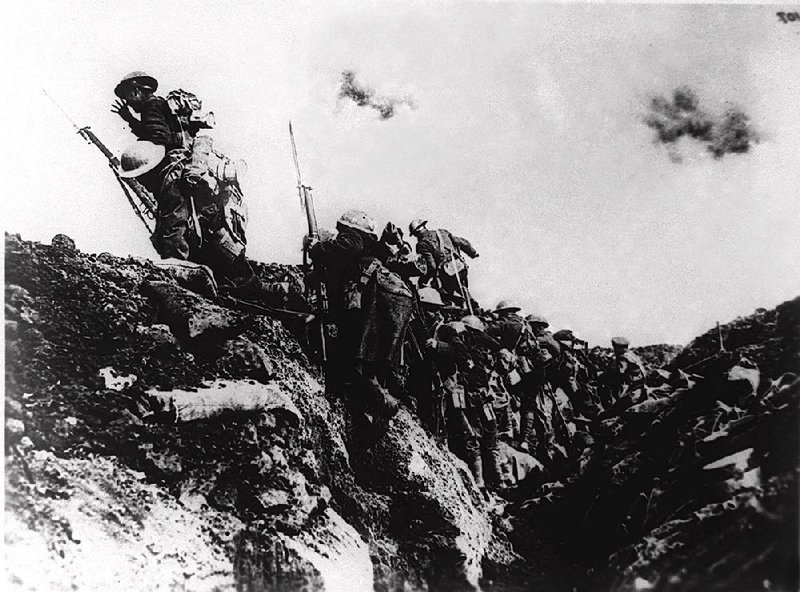For many viewers, World War I is ancient, ancient history. It may as well be the War of the Roses.
The more removed from the present a historical event becomes, the more difficult it is to keep in perspective. That's why I love the History Channel.
It has been only 100 years since the world was plunged into darkness following the assassination of Archduke Franz Ferdinand of Austria. Despite the passage of a full century, the repercussions from "the war to end all wars" linger to this day.
History Channel is commemorating the 100th anniversary of WW I with a four-hour miniseries that focuses on the modern weapons introduced during a transitional time in history.
WWI: The First Modern War begins at 7 p.m. Saturday and runs to 11. They call it a miniseries, but the four parts air back to back. It's more like a four-hour special.
Military history buffs may argue that the Civil War was actually the first modern war. It had the first rifles that were accurate at a distance; the Confederates had a submarine; floating mines sunk ships; there were observation balloons; and even trench warfare.
Modern? The use of outmoded, Napoleonic, stand-and-shoot battlefield tactics contributed to the horrendous casualty lists.
We'll leave the debate for the experts and concentrate on what History Channel is serving up -- "a pivotal game-changing moment in history" when powerful new weapons overwhelmed traditional battlefields.
The miniseries draws on experts, eyewitness testimony, archives and re-creations to focus on four main aspects of the conflict and to explain their development, strategy and ultimate effectiveness.
Here's an overview.
Armored Beasts, 7 p.m. -- Adapted from an American tractor with caterpillar tracks, tanks were designed in secrecy to break through the heavily fortified trenches and offer protection for troops that were being mowed down by artillery and machine gun fire. A massive failure in their first combat, tanks would become a decisive weapon in the war.
Massive Air Attacks, 8 p.m. -- The first German Blitz wasn't over London in WW II. It happened during WW I when bombs were dropped from giant airships designed by Count Ferdinand von Zeppelin.
Clouds of Death, 9 p.m. -- The Germans, ignoring international treaties, were first to weaponize chemicals. In their case, it was chlorine. Their action unleashed an escalation of poison gas weapons of mass destruction on both sides.
Underwater Killers, 10 p.m. -- German submarines sank 5,200 ships by war's end, and nearly brought Britain to its knees.
• Project Runway. Nobody screams at anybody on Project Runway (see Hell's Kitchen below). At least Tim Gunn and Heidi Klum don't scream. The contestants may throw a snit now and then, but nothing too dramatic.
Season 13 of the fashion design competition kicks off at 8 p.m. today on Lifetime with contestants ranging in age from 22 to 45.
Here's a handy list so you can keep them straight from the beginning:
Alexander Knox, 22, Chicago; Angela Sum, 32, Toronto; Carrie Sleutskaya, 24, San Diego; Char Glover, 37, Detroit; Emily Payne, 40, Temple, Texas; Emmanuel Tobias, 29, Dallas; fade zu grau, 45, Coral Gables, Fla; Hernan Lander, 33, San Francisco de Macoris, Dominican Republic; and Jefferson Musanda, 25, Lynn, Mass.
Also, Kini Zamora, 30, Kapolei, Hawaii; Korina Emmerich, 28, Eugene, Ore.; Kristine Guico, 26, Naperville, Ill.; Mitchell Perry, 25, Jacksonville, Fla; Nzinga Knight, 33, Brooklyn, N.Y.; Samantha Plasencia, 27, San Antonio; Sandhya Garg, 28, Birmingham, Ala.; Sean Kelly, 25, Wellington, New Zealand; and Tim Navarro, 32, Rochester, Minn.
I like to pick the strangest looking free spirit (but it's getting harder) to root for. This season, Carrie has the grape-purple hair, but elder statesman, fade zu grau, goes by the lowercase German phrase "fade to gray." Cool.
• Hell's Kitchen. Season 12 wraps up at 7 p.m. today with a cook-off between finalists Scott and Jason. I know this is a big deal for many viewers, but I just never have gotten into Gordon Ramsay screaming at people. I'm sure he's a lovely man once you get to know him.
• Cancelled. I wish more networks would do this. Not happy with the way scripts were going, Fox pulled the plug on its midseason drama Hieroglyph before a single episode saw the light of day.
For me, that's far better than putting a sucky and doomed series on the air and killing it after two episodes.
Hieroglyph was an action-adventure drama set in ancient Egypt starring Max Brown as an infamous thief pulled from prison to serve the Pharoah (Reece Ritchie).
Somebody at the network liked the pitch, but after the pilot, the thing went downhill.
The TV Column appears Sunday, Tuesday and Thursday. Email:
mstorey@arkansasonline.com
Weekend on 07/24/2014
